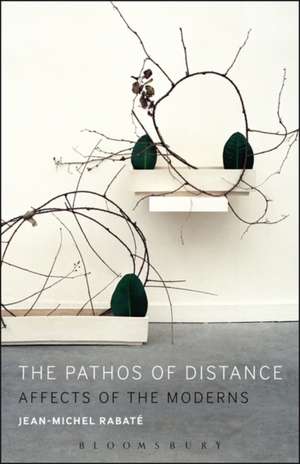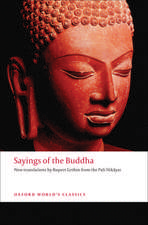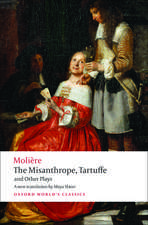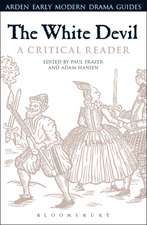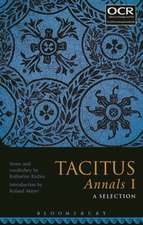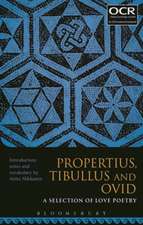The Pathos of Distance: Affects of the Moderns
Autor Professor Jean-Michel Rabatéen Limba Engleză Paperback – 20 apr 2016
| Toate formatele și edițiile | Preț | Express |
|---|---|---|
| Paperback (1) | 308.27 lei 6-8 săpt. | |
| Bloomsbury Publishing – 20 apr 2016 | 308.27 lei 6-8 săpt. | |
| Hardback (1) | 830.29 lei 6-8 săpt. | |
| Bloomsbury Publishing – 20 apr 2016 | 830.29 lei 6-8 săpt. |
Preț: 308.27 lei
Nou
Puncte Express: 462
Preț estimativ în valută:
59.01€ • 64.12$ • 49.60£
59.01€ • 64.12$ • 49.60£
Carte tipărită la comandă
Livrare economică 22 aprilie-06 mai
Preluare comenzi: 021 569.72.76
Specificații
ISBN-13: 9781501307997
ISBN-10: 1501307991
Pagini: 232
Dimensiuni: 140 x 216 x 32 mm
Greutate: 0.32 kg
Editura: Bloomsbury Publishing
Colecția Bloomsbury Academic
Locul publicării:New York, United States
ISBN-10: 1501307991
Pagini: 232
Dimensiuni: 140 x 216 x 32 mm
Greutate: 0.32 kg
Editura: Bloomsbury Publishing
Colecția Bloomsbury Academic
Locul publicării:New York, United States
Caracteristici
Includes
new
readings
of,
among
others,
Yeats,
Joyce,
Woolf,
Gide,
Genet,
Rilke,
Benjamin,
Nietzsche,
Deleuze
and
Derrida
Notă biografică
Jean-Michel
Rabatéis
Professor
of
English
and
Comparative
Literature
at
the
University
of
Pennsylvania,
USA.
He
is
the
author
or
editor
of
more
than
thirty
books,
includingCrimes
of
the
Future(2014),The
Cambridge
Introduction
to
Literature
and
Psychoanalysis(2014),
the
edited
volume1922:
Literature,
Culture,
Politics,
andThink,
Pig!
Beckett
at
the
Limit
of
the
Human(2016).
Cuprins
Introduction:
Formations
of
Pathos:
Nietzsche,
Benjamin,
Warburg1."Pathos
of
distance":
Huneker
and
Barthes
reading
Nietzsche2.
"Hard"
modernism:
Alfred
Jarry3.
The
Birth
of
Irish
Modernism
from
the
Spirit
of
Nietzscheism
4.Ethosvs.Pathosof
the
New
in
19105.
Affect
Effects
Affects:
Deleuzian
Affect
vs.
Lacanian
Pathos6."Playing
Possum":
War,
Death
and
Distance
in
Eliot's
poetry7.
Let
the
wound
speak:
Cocteau'sPathosformel8.
The
Pathos
of
History:
Trauma
in
Siri
Hustvedt'sThe
Sorrows
of
an
American9.
Pathos
of
the
Future:
Nihilism
and
Hospitality
in
The
Childhood
of
JesusConclusion:
When
is
a
door
not
a
door?
Bibliography
Index
Recenzii
An
often
fascinating
mix
of
theoretical
reflection,
intellectual
history
and
literary
criticism
...The
Pathos
of
Distanceis
invariably
interesting
and
its
amazing
erudition
is
simply
dazzling.
In his latest book, the prolifically inventive scholar Jean-Michel Rabaté offers a lyrical meditation on Nietzsche's famous concept of the 'pathos of distance,' drawing out the implications of this pathos for modernist aesthetics. Instead of a conventional go-ahead academic argument, Rabaté presents a 'chronotopic mosaic,' ranging across several languages and cultural traditions. In this panoramic vista, unexpected affinities emerge between such figures as Benjamin and Duchamp, Eliot and Lukács, Kierkegaard and Siri Hustvedt. Breathtaking in range and erudition, and crafted with elegance and wit,The Pathos of Distanceenriches our understanding of modernism while pioneering a new mode of thinking and writing about art and literature.
Jean-Michel Rabaté's exceptional grasp of the broadest landscapes of modern literature, philosophy, psychoanalysis and culture is brought to bear in this volume on a range of writings and visual representations from the late nineteenth century to the present, from Yeats and Eliot to Coetzee and Hustvedt. In these brilliant readings and explorations of terms for thought - aura, allegory, affect - we find texts, images and concepts opened up in entirely new ways.
The Pathos of Distanceis an inspiring achievement, a work of remarkable breadth and precision. It is an invaluable addition to the conversation on modernism and affect . The book reminds us that critical reading at its best - the kind of generous reading that revitalizes conversations and opens up new interpretive avenues - is often complicit with methodological inventiveness.
In his latest book, the prolifically inventive scholar Jean-Michel Rabaté offers a lyrical meditation on Nietzsche's famous concept of the 'pathos of distance,' drawing out the implications of this pathos for modernist aesthetics. Instead of a conventional go-ahead academic argument, Rabaté presents a 'chronotopic mosaic,' ranging across several languages and cultural traditions. In this panoramic vista, unexpected affinities emerge between such figures as Benjamin and Duchamp, Eliot and Lukács, Kierkegaard and Siri Hustvedt. Breathtaking in range and erudition, and crafted with elegance and wit,The Pathos of Distanceenriches our understanding of modernism while pioneering a new mode of thinking and writing about art and literature.
Jean-Michel Rabaté's exceptional grasp of the broadest landscapes of modern literature, philosophy, psychoanalysis and culture is brought to bear in this volume on a range of writings and visual representations from the late nineteenth century to the present, from Yeats and Eliot to Coetzee and Hustvedt. In these brilliant readings and explorations of terms for thought - aura, allegory, affect - we find texts, images and concepts opened up in entirely new ways.
The Pathos of Distanceis an inspiring achievement, a work of remarkable breadth and precision. It is an invaluable addition to the conversation on modernism and affect . The book reminds us that critical reading at its best - the kind of generous reading that revitalizes conversations and opens up new interpretive avenues - is often complicit with methodological inventiveness.
